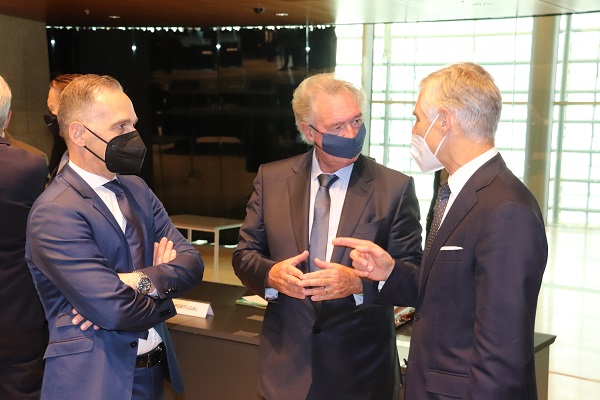 (L-R): Heiko Maas, Germany; Jean Asselborn, Luxembourg; Michael Linhart, Austria;
Credit: MAEE
(L-R): Heiko Maas, Germany; Jean Asselborn, Luxembourg; Michael Linhart, Austria;
Credit: MAEE
On Monday 18 October 2021, the European Union's Foreign Affairs Council met at the European Convention Center Luxembourg (ECCL) in Luxembourg-Kirchberg, with Luxembourg's Foreign and European Affairs Minister, Jean Asselborn, representing the Grand Duchy.
EU Foreign Ministers started the day with an in-depth discussion on the European Union's approach to the Gulf countries, in particular with regard to issues related to stability, the promotion of the global agenda and the strengthening of trade and investment flows. “The Gulf countries are strategic partners with whom we have a lot of common interests, especially in the areas of digitisation and climate change. However, as we have just seen with the failure of the resolution on Yemen at the Human Rights Council, our views remain diametrically opposed on some fundamental issues. It is all the more important to strengthen dialogue at all levels, and to say things clearly when it is necessary," said Minister Asselborn in this context.
Subsequently, Minister Asselborn and his European counterparts had an exchange of views on relations with the countries of the Eastern Partnership. Luxembourg supports the “Recovery, Resilience and Reform” programme, which should enable the long-term transformation and strengthening of the resilience of partner countries, particularly in the context of the effects of the COVID-19 pandemic and the implications for stability politics and economics of these countries.
During the working lunch that followed, the Foreign Ministers had an in-depth discussion on the latest developments in Ethiopia, in particular with regard to the humanitarian situation, as well as on the common approach that the EU could take in the face of this crisis. In this regard, Jean Asselborn expressed concern about the humanitarian situation on the ground, both in Tigray and in neighbouring regions. "In such a serious humanitarian context, the recent expulsion of UN personnel and the discourse of the federal government against humanitarian workers are completely unfounded", underlined minister Asselborn, before adding that "despite the relative success of the establishment of a European humanitarian airlift which allowed the landing of a second plane in Tigray, the urgency of obtaining unhindered humanitarian access for trucks is more pressing than ever".
An exchange of views on the political situation in Nicaragua ahead of the 7 November elections was also on the agenda. In this context, Minister Asselborn intervened on behalf of the BeNeLux countries to express the BeNeLux's concern about the current political situation in Nicaragua, which suggests that the 7 November elections will be neither free, nor fair, nor transparent. The BeNeLux countries also underlined the importance for the EU of continuing to call for the release of political prisoners, the return of human rights organizations, the opening up of political and civic space, as well as the place for an inclusive dialogue between the regime and the opposition.
In the afternoon, ministers discussed current European and international issues, which allowed them to discuss the current situation in Afghanistan, Tunisia and Mali. Regarding Afghanistan, the head of Luxembourg's diplomacy underlined that, faced with the rapid deterioration of the humanitarian and socio-economic situation, the Grand Duchy supports a European approach calibrated with the objective of avoiding a humanitarian crisis. For its part, Luxembourg is taking its responsibilities, and recently decided to increase its humanitarian support to people in need in Afghanistan and to support the Team Europe initiative aimed at improving the situation of displaced people affected by the situation. The latest developments in the Western Balkans were also mentioned in this context, as was the situation in Belarus and on the border between Belarus and Poland.
Finally, on the sidelines of the EU Foreign Affairs Council meeting, Minister Asselborn had a bilateral meeting with his Greek counterpart, Foreign Minister Nikos Dendias. The meeting notably provided an opportunity to take stock of bilateral relations between Luxembourg and Greece, as well as to have an exchange of views on the latest international and European developments. In this context, Ministers Asselborn and Dendias focused in particular on the situation in the Western Mediterranean, the Western Balkans and Afghanistan. Issues related to migration and free movement within the EU were also discussed.








